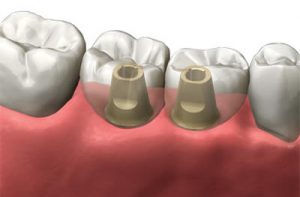Dental Implant Recovery
Looking after yourself and your new implants!
 There are many good reasons to choose dental implants as a replacement when you have lost a tooth, or a number of teeth.
There are many good reasons to choose dental implants as a replacement when you have lost a tooth, or a number of teeth.
Unlike dentures which sit above the gums, implants are placed, at our Ipswich practice, into the jawbone and act as a substitute tooth root. This means that they are more stable than a denture and also offer a degree of strength that will enable you to eat any food that you want without worrying if they will become loose in your mouth.
We have covered the procedure surrounding the placing of implants on our Ipswich dentist blog before. This time, we look at what you need to do when you are recovering from the procedure. This will not only help to make things more comfortable for you but will also minimise any risk of damage to your new implant.
Smoking
If you smoke, it is very important that you stop, not only before your procedure, as you will have been instructed, but also afterwards, especially whilst the implant fuses with the bone. Studies have shown that smoking significantly increases the risk of implant failure. This is due, in part, to it being a significant contributor to periodontal diseases that can lead to bone loss. If the bone holding your implant degrades, the implant may become unstable and even come out.
Individual implant placement recovery
Although this very successful procedure will leave you with strong and long lasting replacement teeth, it is still a minor surgical procedure and patients should expect a degree of discomfort in the area of the treatment for a short while afterwards. This is usually quite manageable by taking your usual pain killing medication for a few days. Any rare cases of significant pain should be discussed with your dentist and, of course, we are also available for any other aftercare advice as well.
There are things that you can do to help yourself though and which will also help your new implants to get off to a good start.
Immediate aftercare
You may feel a bit sore and uncomfortable for a short while after your procedure and it is a good idea to make sure that you have your usual painkillers at home should you need them. A little soreness is to be expected but these will help. Be kind to yourself too and rest for a day or so where possible. You should certainly avoid any strenuous activity or any activity that ‘jars’ your body, such as running. If you have had sedation for your treatment, you should also make sure not to drive or operate any potentially dangerous machinery for at least 24 hours afterwards to allow it to leave your system.
With regards to eating, you should avoid putting any pressure at all on your new implant for a little while. This means that you should plan a diet that includes thin soups, yoghurt and any liquidised foods. This will enable your implant to start to bond with the bone without placing any undue stress upon it.
Intermediate aftercare
After a little while, the soreness will go and your implants will have had the chance to start the osseointegration process. Soon, you will be able to progress to eating more solid foods. You should still be cautious though and any food that requires significant biting or chewing should be avoided. Suitable foods include things such as mashed potato, soft eggs and well cooked pasta.
Long term care
Once your implants have fully integrated with the bone and following advice from our implant dentist, you can then start to eat your usual diet. We would still advise that you do this gradually, mainly for your own comfort.
At this stage, the main thing that you need to do is to clean them well. Your dentist will have advised the correct cleaning method for the previous two stages, but once your implants are fully established you should clean them as you would your natural teeth with diligent brushing, flossing and regular visits to our hygienist for a scale and polish and checks.
Same day implant recovery
Much of the above applies also to same day dental implants. This is where a fixed bridge has been attached to a small number of implants. Due to the use of a special type of implant, these are more immediately stable and you could, in theory, start to eat similar foods to what you did before more quickly. We would still advise to eat cautiously for a while as there will still be some soreness and eating foods that need significant chewing or biting is likely to cause additional discomfort.
We are always pleased to discuss the benefits of dental implants with our patients so if you would like to find out more about them, why not call the Foxhall Dental Practice on 01473 258396 and arrange a consultation with one of our experienced dentists? We look forward to your call!
